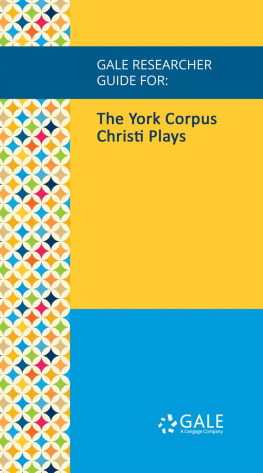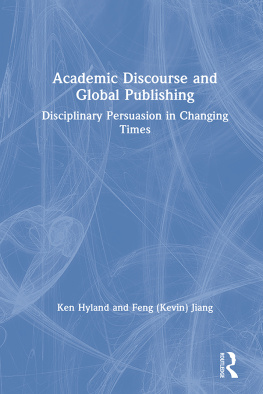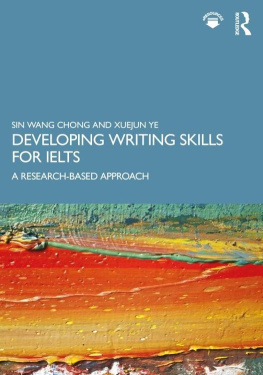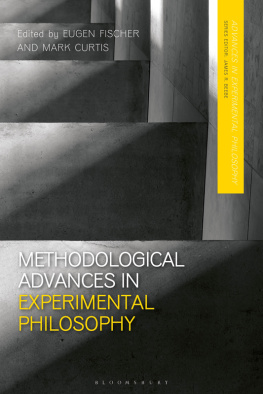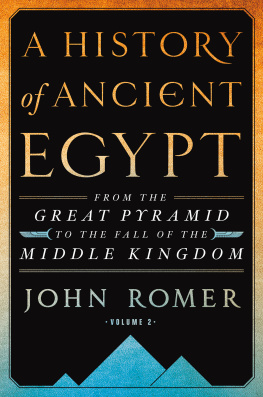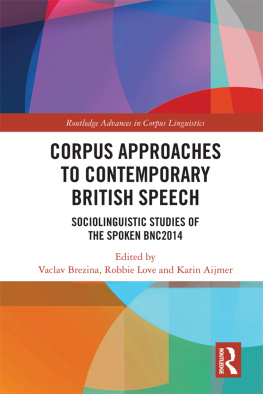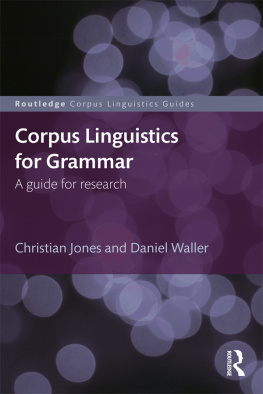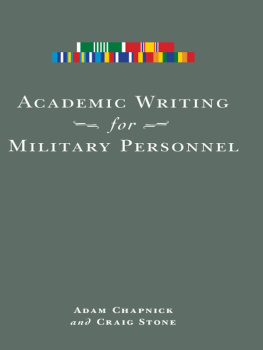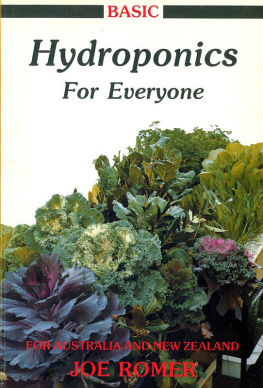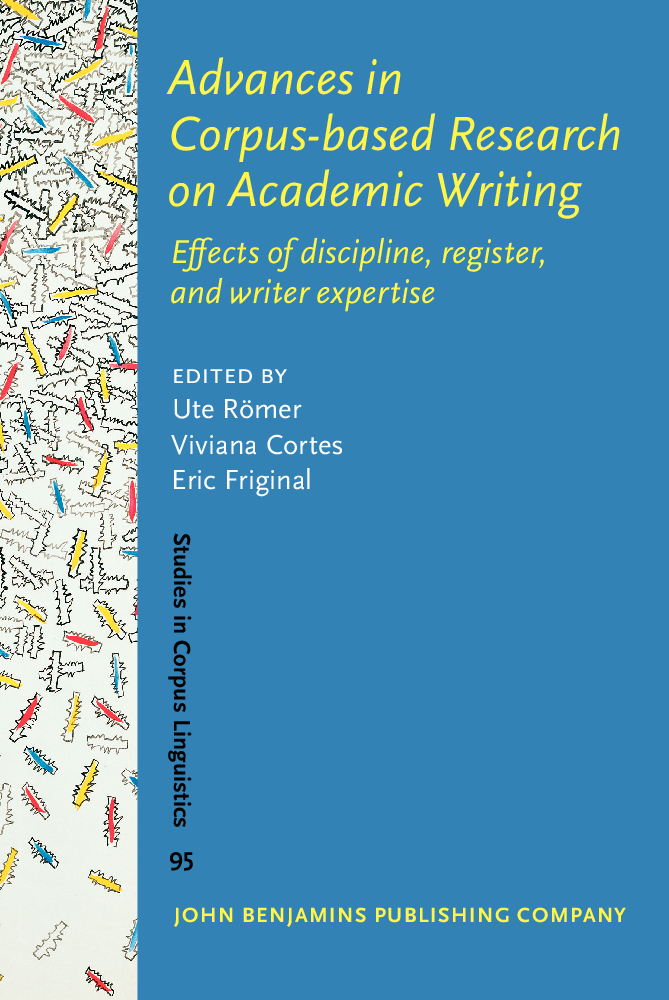

Advances in Corpus-based Research on Academic Writing
Effects of discipline, register, and writer expertise
Ute Rmer Viviana Cortes Eric Friginal
doi: 10.1075/scl.95
ISBN: 978 90 272 6145 8 (ebook)
Cataloging-in-Publication Data available from Library of Congress:
LCCN 2019055545
2020 John Benjamins B.V.
No part of this book may be reproduced in any form, by print, photoprint, microfilm, or any other means, without written permission from the publisher.
John Benjamins Publishing Company https://benjamins.com
John Benjamins Publishing Company
Amsterdam/Philadelphia
Introduction Advances in corpus-based research on academic writing Ute Rmer, Viviana Cortes & Eric Friginal
Georgia State University
As its title indicates, the present volume showcases recent advances in corpus-based research on academic writing. This topic emerged as a central theme at the 14th conference of the American Association for Corpus Linguistics (AACL), held at Georgia State University in Atlanta, GA in September 2018. The editors of the volume (who also served as organizers of AACL 2018) invited authors who had presented work on this topic at the conference to submit proposals for inclusion in the present volume. Written by a mix of established and up-and-coming researchers, the selected contributions show applications of innovative corpus-based methodologies, replicate earlier studies to validate methodological procedures, investigate academic registers rarely analyzed using corpus-based methods before, and compare the linguistic production of different groups of academic writers against each other. What we consider particularly novel aspects of the collection are the inclusion of research that combines rhetorical moves with multi-dimensional analysis, work that incorporates textual position analyses of frequent items across disciplines and languages, studies that cover both fixed and variable phraseological items (lexical bundles, phrase-frames, constructions), and research that is based on corpora of English as an academic lingua franca.
:1518, for a summary of studies of language use in academic research articles). There is, however, still a lot of unexplored territory in this area a gap that the contributions to this volume attempt to address.
The studies included in this volume are based on a wide range of corpora spanning first (L1) and second language (L2) academic writing at different levels of writing expertise, containing texts from a variety of academic disciplines (and sub-disciplines), and of different academic registers. These three areas of focus (writer expertise and L1 status, disciplinary variation, register variation) provide the organization of the volume and the division of its 14 chapters into three parts.
of the volume entitled Students use of lexical bundles: Exploring the discipline and writing experience interface is written by Ndeye Bineta Mbodj and Scott Crossley. The authors use a variety of corpora of novice and expert writing in medical and non-medical fields to investigate in what ways and to what extent academic writing expertise and field-specific knowledge contribute to the production of medical lexical bundles. With its concentration on medical English, the Mbodj and Crossley chapter serves as a bridge between the first part and the second part of the collection which focuses on disciplinary variation.
The chapters in of the volume highlight how academic writing may differ based on the discipline or sub-discipline texts come from. First up, Bethany Gray, Elena Cotos and Jordan Smiths contribution entitled Combining rhetorical move analysis with multi-dimensional analysis: Research writing across disciplines is methodologically particularly interesting. It shows how two analytic techniques that are commonly used in academic writing research can be integrated to provide valuable new insights into the mapping of communicative functions and linguistic patterns in research articles from a wide range of disciplines. Informed by the results of their study, the authors also argue for further required adaptations of multi-dimensional analysis for use with move-annotated data. Next, Randi Reppen and Shannon Olson in their chapter entitled Lexical bundles across disciplines: A look at consistency and variability, discuss both discipline-specific and cross-disciplinary fixed bundles, as well as bundles with variable slots (also known as phrase-frames), in a large corpus of course readings from nine disciplines (Architecture, Business, Culinary Science, Digital Arts, Fashion Design, Film, Hospitality Industry, Interior Design, and Studio Arts). The authors highlight the value of especially those bundles they identified as cross-disciplinary in pedagogical contexts and share practical activities that may promote awareness of lexical bundles for students and teachers. Also focusing on lexical bundles and sharing insights of pedagogical relevance, the chapter by William Lake and Viviana Cortes on Lexical bundles as reflections of disciplinary norms in Spanish and English literary criticism, history, and psychology research illuminates aspects of humanities and social sciences writing in two world languages. Access to parallel corpora of research articles in English and Spanish allowed the authors to not only analyze disciplinary but also cross-linguistic variation in lexical bundles which appear in sentence subject position and contain epistemic or phenomenal nouns. The next chapter by Deise Dutra, Jessica Queiroz, Luciana de Macedo, Danilo Costa and Elisa Mattos on Adjectives as nominal pre-modifiers in chemistry and applied linguistics research articles also looks at patterns within noun phrases but focuses on how attributive adjectives are used to modify nouns. The authors use two matched corpora of research articles from chemistry and applied linguistics to highlight disciplinary preferences in the frequency of adjective pre-modifiers, the length of noun phrases, and the specific functions they express. The chapter by Tatiana Nekrasova-Beker and Anthony Becker on The use of lexical patterns in engineering: A corpus-based investigation of five sub-disciplines shifts the focus from disciplinary to sub-disciplinary variation in the expanding field of engineering. Based on data from five corpora of undergraduate engineering textbooks and focusing on variable multi-word sequences (phrase-frames, such as the * part of the), the authors show overlap in sub-disciplinary writing in terms of frequencies and structural characteristics of common phrase-frames while at the same time highlighting interesting differences in the discourse functions that these sequences express. Three engineering sub-disciplines as well as physics are also in the spotlight in Kimberly Becker and Hui-Hsien Fengs chapter entitled Stance in unpublished student writing: An exploratory study of modal verbs in MICUSPs physical science papers. Their study offers relevant new insights into variation in the use of modal verbs as stance features and has important pedagogical implications for disciplinary writing contexts.
The contributions to of the volume discuss the ways in which register or text type affect academic writing. First, Jungwan Yoon and Elliott Casal take a phraseological approach to describing how academic writers realize their rhetorical goals in conference abstracts. In their chapter entitled P-frames and rhetorical moves in applied linguistics conference abstracts, the authors combine quantitative and qualitative analysis to link phrase-frames to rhetorical moves. Their results indicate that phrase-frames are not only highly prevalent in this academic register but also that they are associated with particular rhetorical functions. Next,



